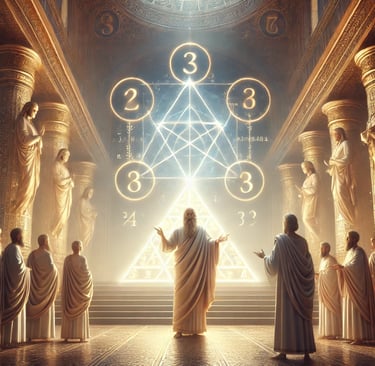Pythagoreanism: The Mystical Union of Numbers, Philosophy, and the Cosmos
Pythagoreanism is more than just a school of thought—it’s a captivating blend of mathematics, mysticism, and philosophy that has left an enduring mark on Western civilization. Founded by the enigmatic Pythagoras of Samos in the 6th century BCE, this movement sought to uncover the hidden order of the universe through numbers, ethics, and cosmic harmony. Though Pythagoras himself left no writings, his followers carried forward his teachings, blending logic with spirituality in ways that continue to intrigue scholars today.
2/6/20252 min read


Numbers: The Key to the Universe
At the heart of Pythagoreanism lies the belief that numbers are not just tools for counting but the fundamental essence of reality itself. The Pythagoreans saw mathematical relationships everywhere—from the harmony of musical notes to the structure of the cosmos. The famous Pythagorean Theorem, which describes the relationship between the sides of a right triangle, is just one testament to their deep fascination with numbers. However, their numerical explorations went beyond practical geometry; they believed that numerical ratios governed everything, from planetary orbits to human souls.
The Pythagorean Way of Life
Pythagoreanism wasn’t just about abstract mathematics—it was also a strict way of life. Followers adhered to rigorous ethical and dietary rules, emphasizing purity and self-discipline. They believed in the transmigration of souls, the idea that the human soul is immortal and moves through different bodies over time. This belief encouraged them to live virtuously, avoiding the consumption of meat and practicing deep contemplation. Silence, harmony, and self-control were core values, as they sought to align their lives with the mathematical perfection they saw in nature.
The Cosmic Music of the Spheres
One of the most poetic and enduring ideas of Pythagoreanism is the concept of the “music of the spheres.” Pythagoreans believed that celestial bodies moved according to mathematical ratios, producing an inaudible but divine harmony in the universe. Though this idea may sound mystical, it prefigured later scientific discoveries about planetary motion and acoustics, showing how deeply they connected numbers with the structure of reality.
The Enduring Influence of Pythagoreanism
While the Pythagorean brotherhood eventually faded, its ideas lived on, influencing major thinkers like Plato, who incorporated numerical and geometric concepts into his philosophy. The Renaissance saw a revival of Pythagorean thought, especially in music and astronomy. Even today, echoes of Pythagoreanism can be found in fields as diverse as quantum physics, architecture, and spiritual traditions that seek to find hidden order in the universe.
Pythagoreanism remains a testament to humanity’s timeless quest to find meaning in numbers, to see patterns in chaos, and to bridge the gap between science and the sacred. Whether we realize it or not, we are still living in a world shaped by the insights of this ancient and mysterious school of thought.
